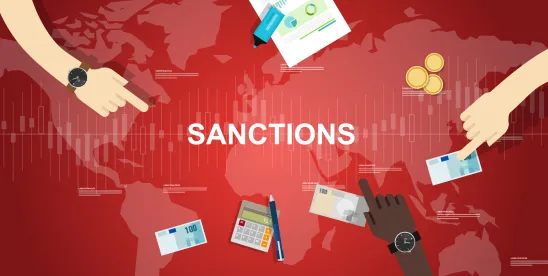The U.S. Department of the Treasury’s Office of Foreign Assets Control (“OFAC”) has issued four enforcement actions during the first half of this year, two in January under former President Biden and two in June under President Trump. These actions, described below, underscore the ongoing relevance of sanctions compliance programs in the Trump era.
2025 Enforcement Actions
January 16, 2025: OFAC entered into a $1,076,923 settlement with the Florida-based real estate company, Family International Realty LLC (“Family International” or “the Company”), and its natural U.S. person owner (“the Owner”) for apparent violations of OFAC’s Ukraine-/Russia-related sanctions. The Company was alleged to have willfully evaded OFAC’s Ukraine-/Russia-related sanctions by transferring ownership of three luxury condominiums owned by two sanctioned Russian oligarchs to their non-sanctioned family members and their corresponding shell companies. During the investigation, OFAC uncovered telephone communications between the Owner and the sanctioned individuals demonstrating the Owner’s knowledge of the oligarchs’ sanctioned status. The Owner is also alleged to have coordinated with a law firm to facilitate the transfer of ownership. As a result, OFAC determined that the Company’s conduct was egregious and not voluntarily self-disclosed. OFAC’s corresponding Enforcement Release underscores that gatekeepers – including investors, attorneys, and other service providers – may be used to conceal or further sanctions evasion. Entities should conduct gatekeeper-related due diligence to ensure that their actions comply with sanctions regulations.
January 17, 2025: OFAC announced a $1,044,781 settlement agreement with California-based tools and parts manufacturer, Haas Automation, Inc. (“Haas” or “the Company”), for apparent violations of OFAC’s Ukraine-/Russia-related sanctions. OFAC alleged that Haas indirectly supplied one computer numerical control machine, 13 spare parts, and seven authorization codes for computer numerical control machines owned by blocked Russian entities between 2019 and 2022, amounting to 21 apparent violations. OFAC characterized eight of the 21 apparent violations as egregious, determining that the Company failed to conduct sufficient due diligence regarding the ownership structures of some of the blocked entities and proper rescreening of the remaining entity. OFAC’s enforcement action highlights the importance of implementing due diligence measures for customers and clients, including direct and indirect users, to minimize sanctions risks.
June 12, 2025: OFAC issued a $215,988,868 civil penalty against California venture capital firm, GVA Capital, Ltd. (“GVA” or “the Company”), for violating OFAC’s Ukraine-/Russia-related sanctions and failing to comply with an OFAC subpoena. The penalty, the statutory maximum and one of the highest OFAC has imposed via a penalty notice, reflects OFAC’s determination that the alleged conduct was egregious and not voluntarily self-disclosed nature of the violation. The violation itself arose from GVA’s management of an investment on behalf of a sanctioned Russian oligarch. Prior to his designation, GVA actively pitched investment opportunities to the oligarch and he ultimately invested $20 million in the Company. GVA continued to manage investments on the oligarch’s behalf even after the designation. Similar to the Family International enforcement action, this case demonstrates the need for effective gatekeeper-related due diligence.
June 16, 2025: OFAC’s $3,882,797 settlement with Texas-based catalyst vendor and consultant, Unicat Catalyst Technologies, LLC (“Unicat” or “the Company”), stemmed from the Company’s alleged sale of goods and services to customers in Iran and its alleged sale of goods to a blocked Venezuelan entity in apparent violation of Iran and Venezuela Sanctions. OFAC determined that the conduct was egregious but that the Company had made a voluntary self-disclosure. The 13 apparent Iran-related violations derived from the Company’s agreements with a regional distributor operating in the United Arab Emirates and Iran to sell products to users in Iran and consultation services performed by a Unicat affiliate in Iran. The one Venezuela-related violation stemmed from Unicat’s distributor selling products to a Venezuelan government-owned entity. Like all of the aforementioned enforcement actions, this matter underscores the importance of effective top-down compliance programs, regular internal auditing procedures, and an overall culture of compliance within entities subject to OFAC regulations. The action also illustrates that industries such as the petrochemical sector that can serve as a source of funds for Iran and Venezuela, present a higher risk for potential sanctions violations.
Current Priorities
While it is still too early to tell how OFAC under President Trump will continue to employ enforcement actions throughout the remainder of his term, the agency has utilized both its designation authorities and other tools to further the administration’s goals. First, OFAC has designated a number of Iran-related entities and individuals, particularly those involved in the oil and petrochemical sectors, in an attempt to exert financial pressure on the regime to prevent further nuclear program development. Second, in alignment with the administration’s heightened focus on illicit drug actors, OFAC has designated a number of drug cartel actors pursuant to Counter-Terrorism-related authorities. This follows the U.S. Department of State’s February 2025 designation of eight drug cartels as Foreign Terrorist Organizations (FTOs). Third, President Trump issued an Executive Order that removed U.S. sanctions on Syria, effective July 1, 2025, following his announcement of the cessation of sanctions at the U.S.-Saudi Investment Forum in May 2025.
Key Pointers
In light of the President’s apparent intention to continue to aggressively utilize sanctions to achieve national security and foreign policy goals, companies should ensure that their compliance programs are properly resourced, trained, and utilized within management structures. While the administration has initiated workforce efficiency efforts at various federal agencies, there is no indication that OFAC has been impacted by these efforts. OFAC, and sanctions in general, appear to continue to be a high priority tool of both this administration and Congress. Accordingly, companies will continue to benefit from robust compliance training programs and top-down commitments to compliance. Institutionalizing compliance best practices will allow companies to better respond to OFAC’s potentially shifting priorities during President Trump’s second term and beyond.





 />i
/>i

